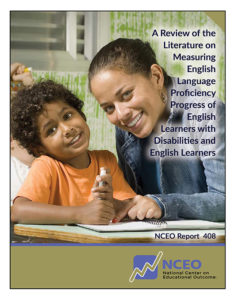 A new literature review published by NCEO examines evidence-based practices used (or recommended for use) to measure progress of English learners (ELs) with disabilities on English language proficiency (ELP) assessments. The report discusses how studies have defined ELP progress and the extent to which studies have examined ELP progress for ELs with disabilities. In addition, the authors examine the methodologies used to measure ELP progress, the evidence base for the studies, and findings specific to ELs with disabilities. The strength of the evidence base was evaluated based on: (a) transparency of study methods, (b) study samples, and (c) author-identified study limitations.
A new literature review published by NCEO examines evidence-based practices used (or recommended for use) to measure progress of English learners (ELs) with disabilities on English language proficiency (ELP) assessments. The report discusses how studies have defined ELP progress and the extent to which studies have examined ELP progress for ELs with disabilities. In addition, the authors examine the methodologies used to measure ELP progress, the evidence base for the studies, and findings specific to ELs with disabilities. The strength of the evidence base was evaluated based on: (a) transparency of study methods, (b) study samples, and (c) author-identified study limitations.
Findings specific to ELs with disabilities were provided by slightly less than half of studies reviewed. A key finding from studies that presented data on ELs with disabilities was that, when compared to ELs without disabilities, these students were less likely to achieve proficiency and reclassification during the study. Thus they were more likely to become long-term ELs.
None of the peer-reviewed literature examined methods currently in use (or being considered for use) by states to measure progress on ELP assessments. Despite this, the literature does have some important implications for the consideration of methodologies for measuring the ELP progress of ELs with disabilities on ELP assessments. First, the studies that included ELs with disabilities confirmed the importance of attending to, and documenting, how many ELs with disabilities are not included in the progress measure because of missing data or data censoring processes. Study findings relevant to ELs with disabilities were also limited by sample size and the nonrandom nature of the samples.
The report concludes with recommendations for researchers and practitioners. Available at https://nceo.umn.edu/docs/OnlinePubs/NCEOReport408.pdf.
